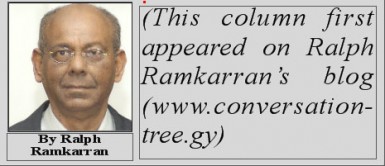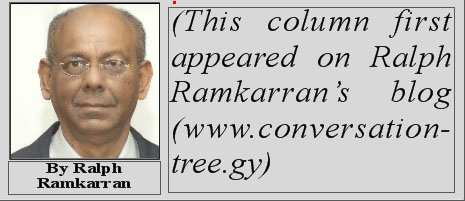For more than twenty years the task of choosing a chairperson of the Elections Commission (Gecom) was without controversy. With the resignation of Dr Steve Surujbally the President invited the Leader of the Opposition to submit a list of six, not unacceptable, names under Article 161 of the Constitution, which was done in  December 2016. The article requires the chair to be a judge, a former judge or a person qualified to be a judge (the ‘judge category’) or a fit and proper person. The President rejected the list in its entirety. He first suggested that only a person in the ‘judge category’ could be appointed but later amended that to indicate that preference must be given to the ‘judge’ category. The President also stated that all the names on the list must be acceptable and if one is not, he is entitled to reject the entire list.
December 2016. The article requires the chair to be a judge, a former judge or a person qualified to be a judge (the ‘judge category’) or a fit and proper person. The President rejected the list in its entirety. He first suggested that only a person in the ‘judge category’ could be appointed but later amended that to indicate that preference must be given to the ‘judge’ category. The President also stated that all the names on the list must be acceptable and if one is not, he is entitled to reject the entire list.
At the invitation of the President, the Leader of the Opposition submitted a second list. This was also rejected by the President. The Leader of the Opposition continued the policy of engagement and indicated that he will submit a third list. However, by that time, Mr Marcel Gaskin, of a new organization called RISE, formed to promote constitutional reform, brought legal-constitutional proceedings seeking answers to four questions. These were: whether the list must include a judge, former judge or person qualified to be a judge; whether the President must state reasons for deeming each of the six names unacceptable; whether the President is obliged to select a person unless he has decided that the persons are unacceptable; whether one person being unacceptable renders the whole list unacceptable. The Guyana Bar Association, entered a case as amicus curiae (a friend of the court) and made submissions. The case was heard before Chief Justice (ag) Roxane George-Wiltshire, who announced an oral decision on July 17. The 33-page written decision became available last week.
The Chief Justice has held that the words “any other fit and proper person” widens the categories of persons who may be appointed. The Chief Justice held that the ‘judge category’ is not required to have priority of consideration by the President. He is not required to consider the ‘judge category’ first and then move on to the ‘fit and proper’ category if he finds no one suitable in the ‘judge category.’ In the words of the Chief Justice: “There is no mandatory category. There is no order of preference in the categories of persons listed in relation to nominees for the post of chairman of GECOM. Persons from each category are equally entitled to be appointed…the Leader of the Opposition cannot be fettered into naming persons who are, or have been, or are qualified to be a judge in the list of persons.”
The government argued that all the names on the list must be acceptable to the President, an issue which was not necessary to be determined in the past because a Chair was always appointed from the first list. While the Chief Justice upheld the right of the President to reject the list in its entirety if he finds that one or all of the names are unacceptable, “if only one is acceptable then the President may choose such a person…It would seem to me that a commonsense approach would be that once there is a person named who is acceptable, then the President has the discretion to choose this person…However, the President can nevertheless exercise his discretion to reject the entire list as being unacceptable…” The Chief Justice overrates the application of ‘commonsense’ to political decision-making.
One obstacle to ignoring this recommended application of ‘commonsense’ is the Chief Justice’s decision that the President must give reasons for rejecting names. The Chief Justice said: “Nevertheless, the modern thinking is that reasons for decisions and actions should be given. The giving of adequate reasons is in effect the essence of democracy and good governance… the Leader of the Opposition is entitled to know the reasons for the rejection of persons named on, or of the entire list…” With this finding the whimsical rejection of the entire list, when all the names are not unacceptable, is made far more difficult.
Finally, the Chief Justice found that the Constitution provided for only one list to be provided and if the President rejected it, he could then proceed to appoint a person in the ‘judge category’ under the proviso. During her oral decision the Chief Justice appeared to have said that a list could be amended; but this did not appear in her written decision. Perhaps in the future, if a President rejects a list and wants to further engage a leader of the opposition, he or she can invite an amendment of the list by deleting all or some of the names and adding or substituting others, thus technically maintaining the fiction of only one list having been submitted.
Whether right or wrong, and I believe that the Chief Justice is right, the clarity and maturity of her reasoning and conclusions are impressive. It even opened the possibility for the Attorney General to declare victory.









